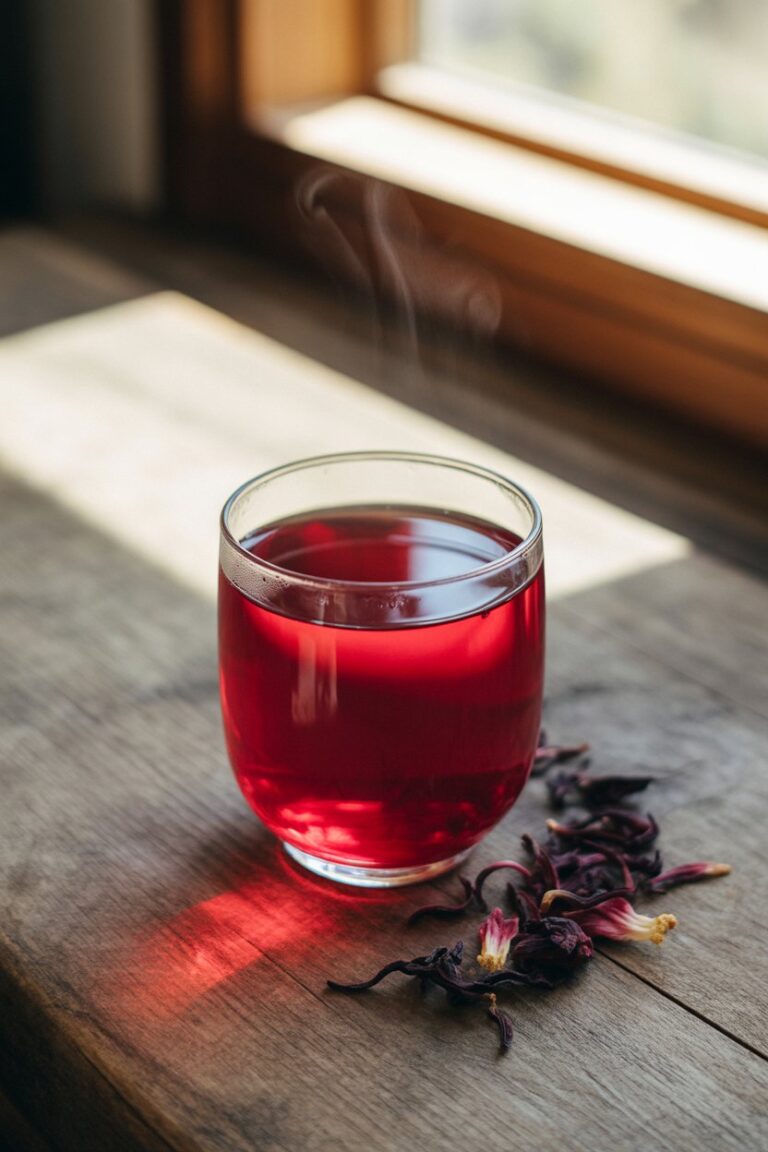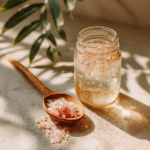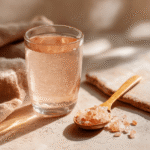Follow Me On Social Media!
Hibiscus Tea Benefits
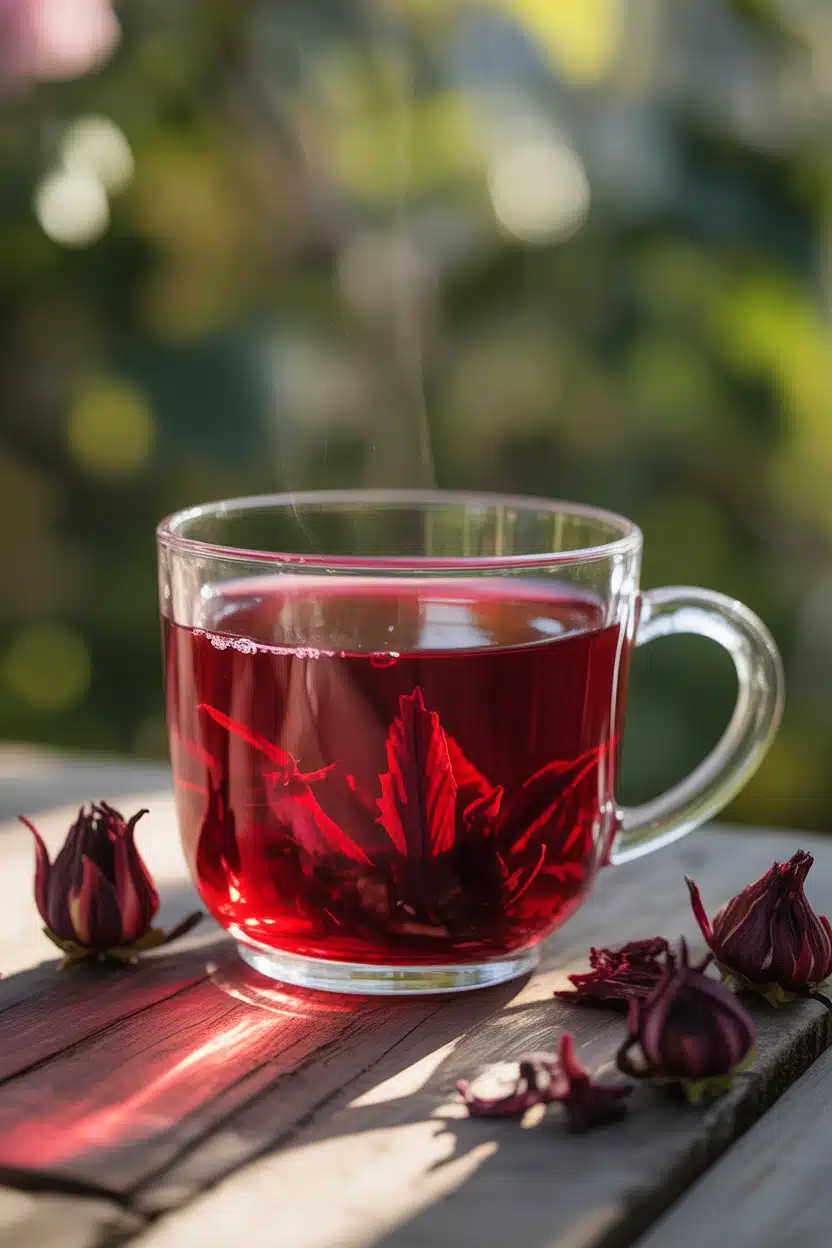
Hibiscus tea benefits have become a favorite topic in the world of wellness. This ruby-red herbal tea is more than a refreshing drink—it’s a natural way to support blood pressure, cholesterol balance, and antioxidant health. Known for its tart, cranberry-like flavor, hibiscus tea is enjoyed around the world as both a cultural tradition and a medicinal ally. In this article, we’ll look at what hibiscus tea is, its health benefits, potential side effects, and why drinking it daily may help lower the risk of chronic disease.
Key Takeaways: What You Need to Know
- Hibiscus tea comes from the dried petals of Hibiscus sabdariffa.
- Hibiscus tea benefits include lowering blood pressure, balancing cholesterol, and boosting antioxidants.
- Research suggests it may help reduce the risk of chronic diseases like diabetes and heart disease.
- Drinking hibiscus tea daily has pros and cons—it offers natural wellness support but may interact with some medications.
- For women, hibiscus tea may ease cramps and support hormone balance.
Jump To :
The Story & Intro
My first sip of hibiscus tea
I still remember the first time I brewed hibiscus tea. I had just returned from a local farmer’s market with a bag of dried crimson petals. As soon as they hit the hot water, the steam carried a bold, citrusy aroma through my kitchen. The liquid turned into a jewel-toned red, almost glowing. That first sip was tangy and refreshing, somewhere between cranberry and pomegranate. It wasn’t just tea—it was an experience that felt both ancient and modern, comforting and energizing at once.
Why hibiscus tea benefits matter today
Hibiscus tea has been used in Africa, Asia, and Latin America for centuries, not only as a drink but as medicine. Today, modern studies confirm what tradition has long suggested: hibiscus tea can lower blood pressure, reduce cholesterol, and provide powerful antioxidants that protect against cell damage. In a world where chronic illness and stress are common, hibiscus tea offers a simple, flavorful way to add protection and balance to everyday life.
Hibiscus Tea Health Benefits
What are the health benefits of hibiscus tea?
Hibiscus tea benefits include lowering blood pressure, balancing cholesterol, aiding weight management, and boosting antioxidant levels. It may also reduce inflammation, protect the liver, and improve blood sugar control. These benefits make hibiscus tea a natural, caffeine-free option for long-term wellness.
Hibiscus tea benefits for blood pressure and cholesterol
One of the most researched hibiscus tea benefits is its ability to support cardiovascular health. The flower’s anthocyanins relax blood vessels, making circulation easier and reducing strain on the heart. Multiple clinical studies confirm that hibiscus tea can lower both systolic and diastolic blood pressure while helping manage cholesterol balance.
Hibiscus tea benefits and side effects
Hibiscus tea has clear pros and cons. On the positive side, it delivers antioxidants, improves circulation, and may help with digestion and weight control. But overconsumption can cause dizziness due to low blood pressure. Pregnant women and those on blood pressure or diabetes medication should consult a doctor before drinking hibiscus daily.
What is Hibiscus Tea?
What is hibiscus tea?
Hibiscus tea is a caffeine-free herbal infusion made from the dried petals of Hibiscus sabdariffa. It has a tart, cranberry-like taste and a striking red color. Hibiscus tea is enjoyed worldwide for its refreshing flavor and recognized health benefits.
The cultural roots of hibiscus tea
Hibiscus tea is known by many names: “agua de jamaica” in Mexico, “karkadé” in Egypt, and “sorrel” in the Caribbean. For centuries, communities have used it to cool the body, ease digestion, and support overall health. This global tradition reflects hibiscus’s enduring role as both beverage and medicine.
Modern recognition from health experts
Today, hibiscus tea benefits are validated by medical institutions such as the Mayo Clinic, which note its ability to improve cardiovascular health. By combining ancient tradition with modern science, hibiscus tea has become a cultural staple and a proven wellness choice.
Can Hibiscus Tea Lower the Risk of Chronic Disease?
Can hibiscus tea lower the risk of chronic disease?
Yes. Hibiscus tea benefits chronic disease prevention by lowering blood pressure, improving cholesterol, balancing blood sugar, and reducing inflammation. Its antioxidants and polyphenols protect cells from damage, helping reduce the risk of heart disease, diabetes, and liver problems when enjoyed regularly.
The chronic disease connection
Chronic diseases like diabetes, cardiovascular issues, and fatty liver disease share common triggers: inflammation, oxidative stress, and poor metabolic balance. Hibiscus tea addresses all three. By reducing arterial stiffness, lowering cholesterol buildup, and stabilizing blood sugar, hibiscus creates a protective environment that lowers disease risks naturally.
Hibiscus tea benefits for diabetes and blood pressure
Several studies highlight hibiscus tea benefits for diabetes management. Drinking hibiscus tea can improve insulin sensitivity and lower fasting blood sugar. Meanwhile, its effect on blood pressure has been consistently positive, making it one of the best natural options for supporting overall cardiovascular and metabolic health.
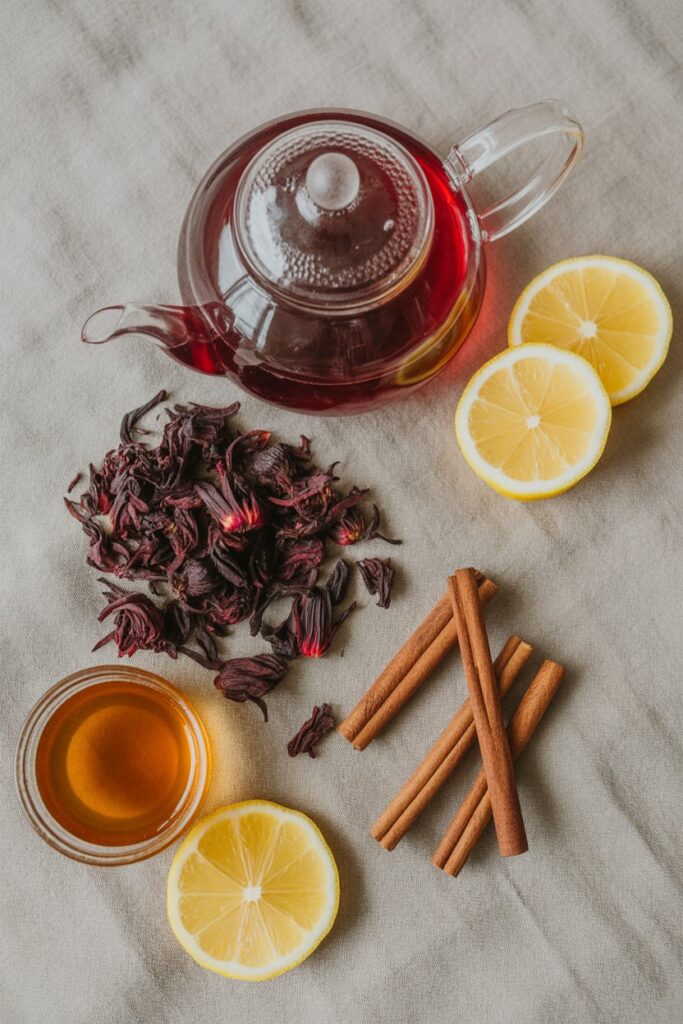
What Happens If I Drink Hibiscus Tea Every Day?
What happens if I drink hibiscus tea every day?
Drinking hibiscus tea every day supports hydration, lowers blood pressure, and boosts antioxidants. However, daily use may also cause overly low blood pressure or interact with certain medications. Moderate intake, usually one to two cups daily, is considered safe for most healthy adults.
The daily pros of hibiscus tea
Sipping hibiscus tea daily keeps the body supplied with antioxidants that fight inflammation. It may help control cholesterol, ease digestion, and reduce sugar cravings when replacing sodas or juice. Many people find it calming, making it a natural ritual for both physical and mental balance.
The daily cons and potential dangers
Overdoing hibiscus tea has downsides. Its blood-pressure-lowering effects can cause dizziness in sensitive drinkers. Pregnant women and people on medications for diabetes or hypertension should use caution. This highlights hibiscus tea’s pros and cons: valuable for wellness, but potentially risky if consumed in excess or without guidance.
What Are 10 Medicinal Uses of Hibiscus?
What are 10 medicinal uses of hibiscus?
Hibiscus tea benefits traditional and modern medicine in many ways. Ten uses include lowering blood pressure, balancing cholesterol, aiding digestion, protecting the liver, supporting weight loss, improving blood sugar, easing menstrual cramps, boosting immunity, calming stress, and defending cells with antioxidants.
A natural medicine chest
Hibiscus has long been used in cultures worldwide for both prevention and healing. Modern studies now confirm many of these traditional uses. Below is a table highlighting 10 recognized medicinal benefits of hibiscus tea:
| Medicinal Use | How Hibiscus Helps |
|---|---|
| Blood pressure | Relaxes blood vessels, lowers systolic & diastolic readings |
| Cholesterol | Reduces LDL, supports HDL balance |
| Digestion | Relieves bloating and mild constipation |
| Liver health | Protects liver enzymes and detox pathways |
| Weight management | Acts as a mild diuretic, lowers sugar cravings |
| Diabetes support | Improves insulin sensitivity, lowers fasting glucose |
| Women’s health | Reduces menstrual cramps, supports hormone balance |
| Cold & flu relief | High vitamin C boosts immune defense |
| Stress relief | Caffeine-free, calming herbal properties |
| Antioxidant defense | Anthocyanins fight oxidative stress and cell damage |
Hibiscus tea benefits for women
Hibiscus tea is often used by women to ease menstrual discomfort. Its antispasmodic compounds may reduce cramping, while iron and vitamin C help replenish energy during cycles. Some traditions also use it to support hormone balance naturally, making it a gentle ally for women’s health.
For more context, hibiscus (Hibiscus sabdariffa) is well-documented as both a medicinal and culinary plant in Wikipedia, providing cultural and scientific background on its uses.
Is Hibiscus Tea Good for Anxiety?
Is hibiscus tea good for anxiety?
Yes. Hibiscus tea benefits people with anxiety by offering a calming, caffeine-free drink rich in antioxidants. While not a sedative, it may lower stress hormones and promote relaxation. Drinking hibiscus tea daily provides a soothing ritual that supports emotional balance.
Hibiscus tea and relaxation
Unlike black or green tea, hibiscus contains no caffeine. That makes it a natural choice for winding down in the evening. Its polyphenols and vitamin C may reduce cortisol, the body’s stress hormone, leading to a mild calming effect. Many people describe hibiscus tea as grounding, especially before bed.
Real-life experience
One of my readers, Elena, once swapped her nightly glass of wine for a warm hibiscus infusion. Within weeks, she noticed better sleep and less morning grogginess. Her story reflects what research shows: while hibiscus tea won’t cure anxiety, its calming nature can support stress management in a gentle, daily way.
For a deeper understanding of herbal teas used for relaxation, you can review the National Center for Complementary and Integrative Health (NCCIH.gov) resource, which covers evidence-based approaches to herbal wellness.

Hibiscus Tea
Ingredients
Equipment
Method
- Bring 4 cups of filtered water to a gentle boil in a saucepan.
- Add dried hibiscus petals and optional ginger slices. Reduce heat and simmer for 10 minutes.
- Remove from heat and let steep for 5 minutes for a stronger flavor.
- Strain into a teapot or pitcher to remove petals and ginger.
- Sweeten with honey or agave and add lime juice if desired. Serve hot or iced.
Nutrition
Notes
Tried this recipe?
Let us know how it was!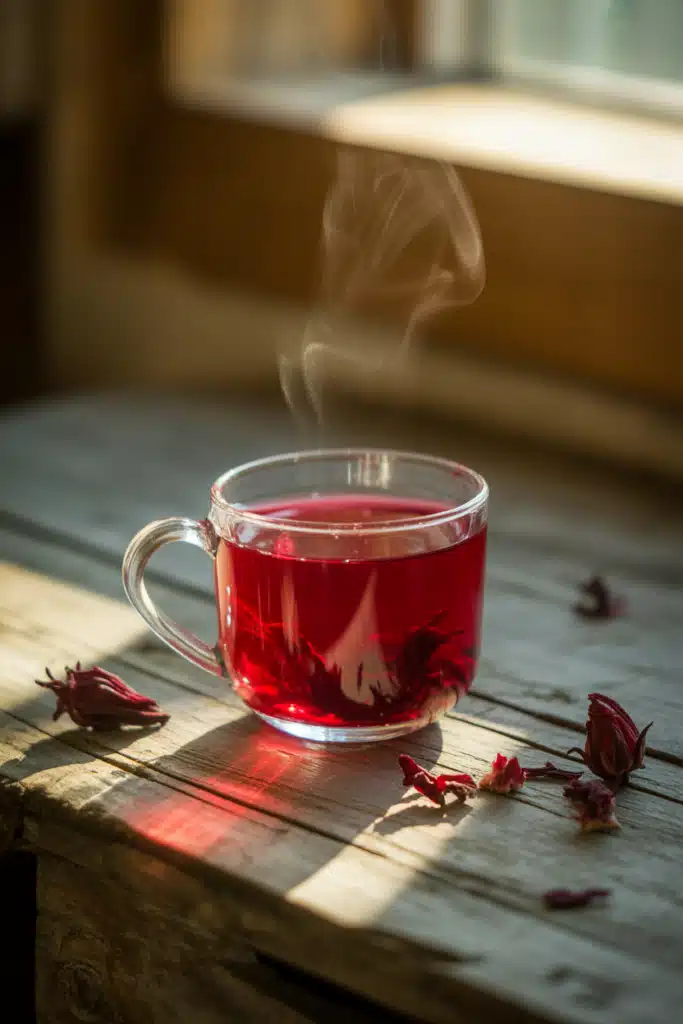
FAQ Section
What are the health benefits of hibiscus tea?
Hibiscus tea benefits include lowering blood pressure, balancing cholesterol, reducing inflammation, and boosting antioxidants. It may also help with digestion, liver support, weight management, and improved blood sugar control. These combined effects make hibiscus tea a powerful, caffeine-free choice for daily wellness.
What is hibiscus tea?
Hibiscus tea is an herbal infusion made from the dried petals of Hibiscus sabdariffa. Known for its tart, cranberry-like flavor and vivid red color, it is naturally caffeine-free. Cultures worldwide enjoy it for refreshment and its scientifically recognized health benefits.
Can hibiscus tea lower the risk of chronic disease?
Yes. Hibiscus tea benefits chronic disease prevention by lowering blood pressure, supporting cholesterol balance, and stabilizing blood sugar. Its antioxidants reduce inflammation and protect cells from oxidative stress. Research suggests regular consumption may reduce the risk of heart disease, diabetes, and liver conditions.
What happens if I drink hibiscus tea every day?
Drinking hibiscus tea daily supports hydration, blood pressure, and antioxidant intake. Most adults benefit from one to two cups each day. However, excessive use may cause overly low blood pressure or interact with medications, so moderation and medical guidance are recommended for safe daily use.
What are 10 medicinal uses of hibiscus?
Hibiscus tea benefits medicine by supporting blood pressure, cholesterol, digestion, liver health, weight control, and diabetes management. It also eases menstrual cramps, boosts immunity, relieves stress, and protects cells with antioxidants. These ten uses highlight hibiscus as both a traditional remedy and a modern wellness ally.
Is hibiscus tea good for anxiety?
Yes. Hibiscus tea is caffeine-free and calming, making it a gentle choice for stress relief. Its antioxidants and nutrients may help reduce stress hormones. While not a medical treatment for anxiety, drinking hibiscus tea regularly can support relaxation and improve overall emotional balance.
Conclusion
Hibiscus tea benefits stretch far beyond its ruby-red glow. From lowering blood pressure to protecting against chronic disease, it blends tradition with science in a cup. While daily use offers antioxidant support and heart health, moderation is key to avoiding side effects. Whether served hot on a quiet morning or iced at a summer gathering, hibiscus tea is a flavorful, natural way to care for both body and mind.

